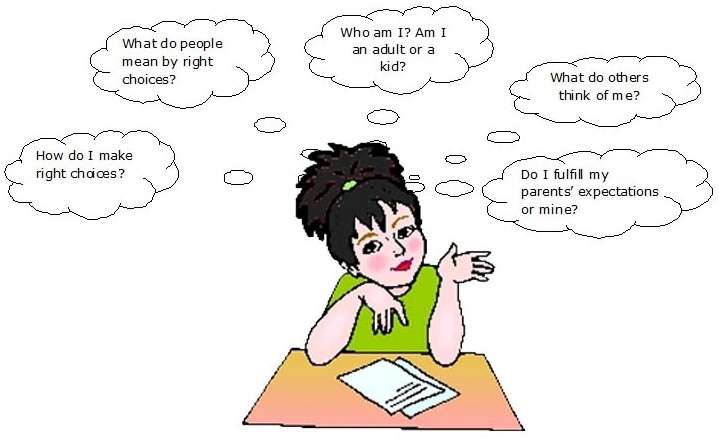 Our early life experience is very important as to how we grow as individuals. Our identity evolves at various stages of life. We perceive and present ourselves throughout our lives, as per our sense of identity; we keep searching and understanding ‘who we are’. Understanding this process can lead people to question their ‘negative’ identity labelled by society. Half of life is spent in making big changes in the way we perceive ourselves. Our personalities keep changing as we resolve crises in life, thus, each experience brings a change within us. Erik Homburger Erikson (1902–1994) was a German-American developmental psychologist known for his theory on psychological development of human beings. He is famous for coining the phrase ‘identity crisis’ which means a sense of uncertainty and confusion in which a person’s identity becomes self-doubting. Erikson developed a classical psychological model of 8 stages of human development which till date is unparalleled.
Our early life experience is very important as to how we grow as individuals. Our identity evolves at various stages of life. We perceive and present ourselves throughout our lives, as per our sense of identity; we keep searching and understanding ‘who we are’. Understanding this process can lead people to question their ‘negative’ identity labelled by society. Half of life is spent in making big changes in the way we perceive ourselves. Our personalities keep changing as we resolve crises in life, thus, each experience brings a change within us. Erik Homburger Erikson (1902–1994) was a German-American developmental psychologist known for his theory on psychological development of human beings. He is famous for coining the phrase ‘identity crisis’ which means a sense of uncertainty and confusion in which a person’s identity becomes self-doubting. Erikson developed a classical psychological model of 8 stages of human development which till date is unparalleled.
- 1. Trust vs Mistrust 0-18 months: This is the first stage of human development. The child builds trust in this stage. Infants develop based upon the quality their caregivers give them to meet their basic needs. If these needs are not consistently met, they develop suspicion, distrust, and anxiety. The basic virtue in this stage is hope. According to Erikson, the trust versus mistrust stage is the most important period in a person’s life because it shapes a child’s views of the world perpetually.
- Autonomy vs Shame 18 months –3 years: Autonomy versus shame is the second stage of Erik Erikson’s stages of psychosocial development. This stage takes place between the ages of 18 months to around age to 3 years. According to Erikson, children at this stage are focused on developing a greater sense of self-control. The child in this stage tries to become self reliant. The basic virtue in this stage is will. In this stage a child develops a sense of personal identity which continues to influence his/her ego identity and development for the rest of life.
- Initiative vs Guilt 3 – 5 years: During the initiative versus guilt stage, children begin to assert their power and control over the world expressing it in their play and other social interaction. The basic virtue in this step is purpose. They start exploring lot of things. During this stage, it is important for caregivers to encourage their exploration and to help children make appropriate choices. Caregivers who discourage or act unresponsive may cause children to feel ashamed of themselves and this may affect them in overly depending upon the help of others.
- Industry vs inferiority 5-12 years: This stage occurs during childhood between the ages of five and twelve. The virtue in this stage is competence. Children at this stage learn to read and write, do homework, to do sums, to do things on their own. School and social interaction play an important role during this time of a child’s life. A child’s social world expands considerably as they enter school and gain new friendships with peers. Through social interactions, children begin to develop a sense of pride in their accomplishments and abilities.
Kids who do well in school are more likely to develop a sense of competence and confidence. Children who struggle with schoolwork may have a harder time developing feeling of confidence. They tend to feel inadequacy and develop inferiority complex.
- Identity vs Role Confusion 12-18 years: During this stage of adolescence children explore their independence and develop a sense of self. In this stage success leads to an ability to stay true to oneself, while failure leads to confusion and a weak self image. Children who don’t have a strong sense of their own identitycan easily get influenced by others. This stage is crucial because if the children get wrongly influenced they get into drug addiction, gambling and other dire habits. The virtue in this stage is fidelity.
- Intimacy vs Isolation 18-40 years: The major concern which arises in minds of humans at this stage is of love and intimacy in relationships with other people. Isolation, occurs when a person fails to find a partner and fulfil the urge of sexual intimacy. If they don’t find a partner, they feel lonely and inferior. The basic virtue at this stage is love.
At this stage human build romantic relationships. Erikson believed that close friendships are also important to people at this stage. They develop close, committed relationships with other people. These emotionally intimate relationships in adulthood play critical role in the intimacy versus isolation stage. Besides romantic relationships, friendship plays a vital role at his stage; closeness, honesty, friendship and love are most required for a nourished life.
- Generativity vs Stagnation 40-65 years: This is the seventh of stage of Erik Erikson’s theory of psychosocial development. This stage occurs during middle adulthood. The term generativity was coined by Erikson which refers to establishing an ethnicity/a culture/ a base which will guide the next generation. Generativity also refers to “making your mark” on the world through creating or nurturing things that will outlast an individual. A generative person instigates a change. The virtue in stage is care.
- Ego Integrity vs Despair 65 onwards years: Erikson identified that at this stage a person faces internal conflict which involves reflecting on one’s life and feeling either satisfied and happy with one’s life or feeling of deep sense of regret. Basic virtue in this stage is wisdom.
Change is the essence of life; is a process of emerging, adapting shifting and moving ahead.













































